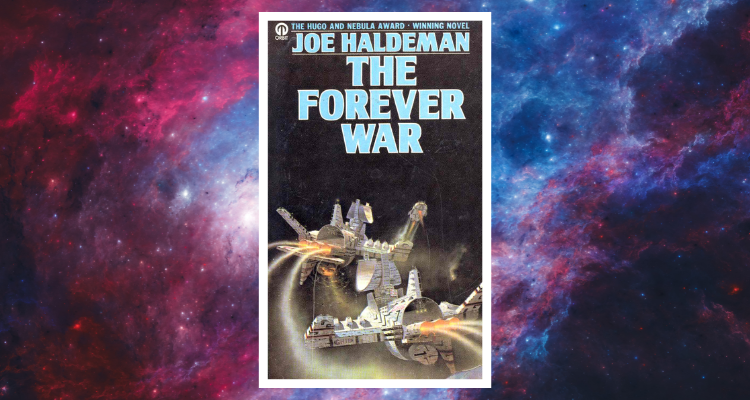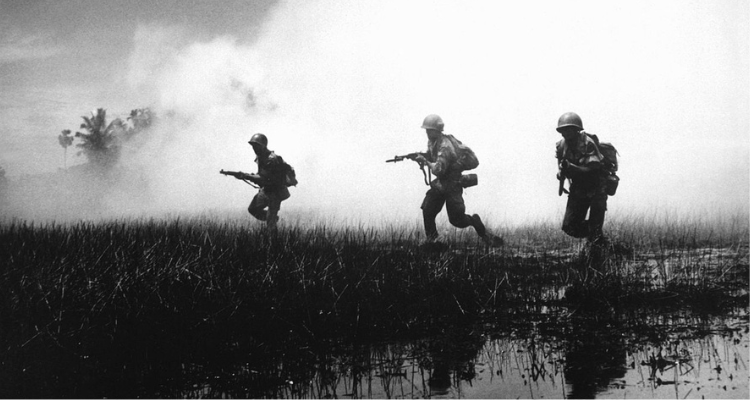|
The first step was the development of advanced starships. The second step was the discovery of “collapsars”, which defy the laws of physics and make faster-than-light travel possible. With these developments, by the end of the 20th century humanity is poised to master the stars. There is only one thing standing in the way - the aliens they dub Taurans. Responsible for the destruction of a number of Earth’s colony ships, these creatures squat malevolently on the worlds around key collapsars.
To combat the threat, the Elite Conscription Act is used to forge a new, interstellar fighting force. Earth’s brightest and best are equipped with the latest weapons, and sent to fight on desolate, distant worlds with low gravity and lakes of liquid helium. Their mission is to find and defeat the Taurans, and make the galaxy safe for human expansion. This is a new kind of war. Travelling at relativistic speeds on the way to collapsars causes powerful time dilation effects, cutting the soldiers off from their families. Within just a few years of subjective time, the Taurans might have advanced their technology by several generations. And if the troops ever get back to Earth, they may not even recognise it - or what remains of the human species. The war with the Taurans stretches on for a thousand years, from Earth’s frame of reference - but was it all worthwhile? Originally published in book form in 1974, The Forever War is a brilliant science fiction novel by American author and Vietnam War veteran Joe Haldeman. While frequently compared with another iconic military SF novel, Robert A. Heinlein’s Starship Troopers (1959), it deserves to be recognised on its own terms. Peter F. Hamilton has called it “a damn near perfect book”, with some justification. This is a science fiction novel that every fan of the genre ought to read.
Initially, segments from The Forever War were published in Analog Science Fiction and Fact which at the time was edited by Ben Bova. The first such story, “Hero”, had been rejected by the previous editor - the legendary John W. Campbell - in part because it featured men and women serving in the military together. After The Forever War was published in book form in 1974, it was a major success for Haldeman. Over the course of the next two years it won the Hugo, Nebula, and Locus Awards for Best Novel.
This rapturous reception was completely justified. The Forever War is a superb book which is by turns exciting, tragic, and thought-provoking. It is a perfect example of its author playing to his specific strengths, being rooted both in Haldeman’s studies in physics and astronomy at the University of Maryland and his time serving as a combat engineer in Vietnam, where he was wounded. Military science fiction is often associated with crass and jingoistic stories, devilled by thin characters and thick tranches of technical detail, and written by authors with obnoxiously right-wing views. The Forever War is very different. It paints a picture of interstellar combat which is as convincing as it is humane. It is also written with real economy, with each chapter moving the story forwards and exploring new aspects of Haldeman’s unsettling future history.
The novel is told in first-person, from the perspective of new recruit William Mandella. Conscripted for his high intelligence, peak fitness and background in physics, Mandella is subjected to harsh training first in Missouri on Earth and later on Charon, a planet beyond Pluto. Numerous recruits are killed during dangerous live-fire exercises and due to the planet’s brutal conditions. The soldiers are told that the Taurans have destroyed human colony vessels and that they are being trained to retaliate.
Much of the book follows Mandella’s military career. More through luck than judgement, he survives numerous engagements with the Taurans and is promoted into the senior ranks. He ages slowly relative to the hundreds of years passing on Earth. During a brief time living there as a civilian, he is alienated by the changes that have taken place. His homeworld has endured catastrophic Ration Wars, and is now overpopulated and violent, with jobs being in desperately short supply. Mandella and his lover, fellow trooper Marygay, try to enjoy the new world as best they can. They are among the first soldiers to return from the war, and have become celebrities - wealthy ones, due to the effect of compound interest. Despite their best efforts they become increasingly alienated and tragedy befalls them. They re-enlist, hoping to become combat instructors on Earth’s moon, but fall victim to a standing order recalling them to combat duty. Later, Mandella finds that Tauran technology has come on leaps and bounds. In one ironic twist, he finds himself fighting with primitive weapons inside a Tauran stasis field that neutralises electromagnetic radiation. Mandella spirals further and further away from any semblance of the world he once knew. He becomes a senior commander, viewed with disgust and suspicion by his troops, who see him as a throwback still chained to obsolete heterosexuality. In time, he lives to see humanity’s final transformation, which may bring with it the prospect of peace at last.
The Forever War is a truly accomplished military science fiction novel. It offers everything that genre implies: speculation about future warfare, heroic action, and a clear-eyed prediction of technologies to come. It does all of this while never sinking to the level of jingoism, and while asking a set of important questions about conflict, command, change, and communication.
Haldeman’s novel deals with the long-term consequences of short-term decisions, and how people and states can become trapped in ruinous wars that diminish and corrupt them. This central point is of obvious relevance to the Vietnam War, in which the author had fought and which was just coming to an end at the time of publication. It is still significant in the context of today’s “forever wars” - now a common phrase - which only spread more insecurity, fear, and hatred around the world. With its visceral but profoundly humane take on a future conflict in deep space, The Forever War is a classic of 1970s science fiction.
0 Comments
Your comment will be posted after it is approved.
Leave a Reply. |
About
Exploring classic science fiction, with a focus on the 1950s to the 1990s. Also contributing to Entertainium, where I regularly review new games. Categories
All
|


